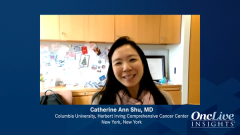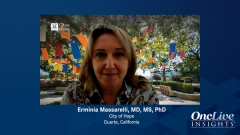
NSCLC: Future Treatment Landscape of EGFR Exon 20 Insertion Mutations
Before closing out their discussion on EGFR exon 20 insertion mutations in NSCLC, experts share their thoughts on the future treatment landscape and potential unmet needs.
Episodes in this series

Transcript:
Catherine Ann Shu, MD: All of your patients need to have comprehensive genetic testing on their tumors. That’s the most important thing I can say. It’s important not only for EGFR exon 20 mutations, but also important for all the other targets we now have. You’re not going to find it if you don’t look, so make sure you’re doing comprehensive NGS [next-generation sequencing] testing for all of your patients.
Erminia Massarelli, MD, MS, PhD: I see the future for studying mutations in non–small cell lung cancer to be very bright because we now have the ability to perform molecular tests on patients as soon as non–small cell lung cancer is diagnosed, especially in early stage. This has opened an important door in non–small cell lung cancer: discoveries of new mutations, sensitizing mutations to treatment, and a possible biomarker for response. The most important effort that oncologists can make is NGS profiling of our patients with non–small cell lung cancer so that we can understand more and more about this cancer.
Using these, not only EGFR tyrosine kinase inhibitors [TKIs], but also in other types of molecular alterations, early in non–small cell lung cancer is a key component. Very often patients with non–small cell lung cancer who have driver mutations, even if they present at an early stage, they have a pretty high tendency to metastasize, especially to the brain, which is the site of 40% of recurrences in EGFR mutated non–small cell lung cancer. I think the money should really be put toward molecular profiling in non–small cell lung cancer and then treating these patients with a more tailored approach. A non–small cell lung cancer with a driver mutation is a very different type of cancer from a nondriver mutation altered non–small cell lung cancer that arises in a prior smoker, and will most likely do well on immunotherapy. I think the most important thing we can improve is the rate of molecular profiling for non–small cell lung cancer, which unfortunately is still suboptimum in the United States, especially in community type or small practices.
Catherine Ann Shu, MD: I think having these new drugs for EGFR exon 20 is a real morale boost for all of us. It’s exciting for the patients, and it’s exciting for the investigators because we’re finding that these targets that were once considered undruggable are now druggable. It’s the same thing for KRAS mutations, it’s exciting for us. It shows that the research that we do matters, and it shows that we’re able to make a difference by finding the right key to the right lock. Being able to then bring that to the patient level and see a patient respond is so gratifying.
Other interesting things that we’re looking at with amivantamab are CNS [central nervous system] penetration, and how we can improve responses. There’s a CHRYSALIS-2 trial going on that’s looking at amivantamab in addition to a tyrosine kinase inhibitor, a third-generation TKI called lazertinib. The thought of combining the 2 is important because lazertinib has CNS penetration. For amivantamab, we’re not really sure about its CNS penetration yet. But we know that brain metastasis is often a big problem for these patients, so can we combine these 2 drugs to provide better responses and provide better coverage in the CNS? Also, if that combination works well, how does it compare to first-line osimertinib? There’s an ongoing trial called MARIPOSA that’s randomizing patients to first-line osimertinib vs amivantamab plus lazertinib.
I think there are a lot of exciting things to look forward to. We’re all building on great research from all of these scientists and physicians before us. I feel really lucky to do this work because it is really cool.
Transcript edited for clarity.






































